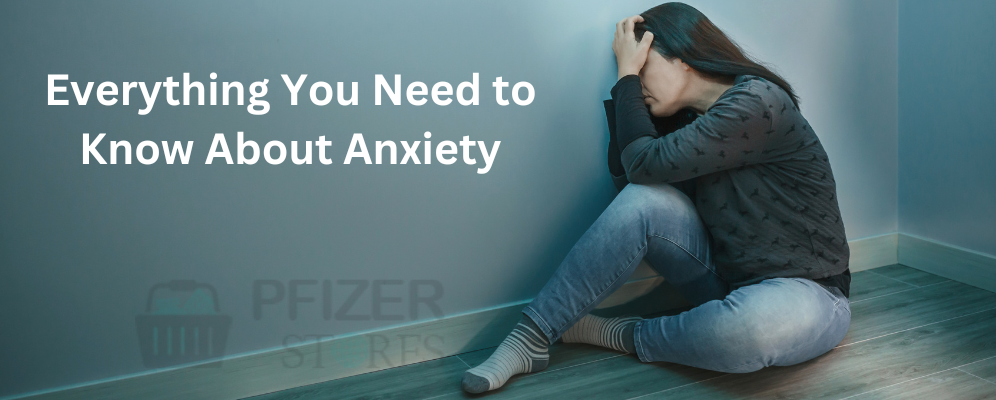Overview :
Obviously, it is obvious to feel anxious about starting a new job, moving to a new place, and taking tests. This type of anxiety is not too good, but it may motivate you to do a better job and work harder.
Ordinary anxiety is a feeling that occurs and goes but does not affect the individual’s daily life. In the case of anxiety disorder, the sense of stress may be with patients all the time. It is intense and something debilitating. This type of stress may cause people to stop doing things they enjoy more.
In extreme cases, it may cure you from entering an elevator, leaving your home, and crossing the street. If left untreated, the anxiety may become worse.
What is anxiety?
Anxiety is our body’s natural response to stress. In other terms, anxiety is a feeling of apprehension or fear about what’s to come or what’s going on. Giving a speech on the first day of school and going to a job interview may make most people nervous and fearful.
But if feelings of anxiety or fear are extreme, last longer than six months, and interfere with an individual’s life, there is a risk of Anxiety disorder.
Anxiety is the natural response of your body to stress. It is the fear of what is to come. However, if your anxiety is extreme and lasts for more than six months, it can be a mental health disorder.
It is pretty reasonable to feel anxious about certain new or unique situations in life. Basic anxiety is the one that comes and goes.
But in the case of anxiety disorder, the fear stays with you all the time. It is intense as well as debilitating. Anxiety disorder is way more than temporary fear or worry. Anxiety disorders mainly include generalized anxiety disorder (GAD), panic disorder, and other related disorders.
Common symptoms of an anxiety disorder include:
- Motor tension like twitching, trembling, aches, soreness, feeling shaky, fatigue, and restlessness.
- Autonomic hyperactivity includes smothering sensations, shortness of breath, palpitations or pounding, dry mouth, cold or clammy hands, lightheadedness, accelerated heart rate, dizziness, frequent urination, chills, abdominal distress, or flushes, a lump in the throat, nausea, or diarrhea.
- Vigilance and scanning like feeling on edge keyed up, concentration issues, exaggerated response, irritability, sleep problems or mind going blank.
What are the types of Anxiety disorders?
Anxiety disorder is a vital part of several different disorders, including the following:
- Social anxiety disorder: SAD is an extreme fear of being judged by others in social events.
- Panic disorder: Feeling recurring panic attacks at unexpected times. An individual with panic disorder may live under the stress of the next panic attack.
- Post-traumatic stress disorder: This condition occurs when someone has surgery or mental trauma that lasts longer.
How to manage Anxiety?
Managing your anxiety is very important to living a healthy life. Some anxiety management options include learning about stress, mindfulness, correct breathing techniques, relaxation techniques, cognitive or behavior therapy, counseling, dietary adjustments, being assertive, exercising correctly, building self-esteem, support groups, structured problem-solving, and medications.
Many different medications help treat anxiety disorders, including anti-anxiety drugs such as benzodiazepines and new anxiety medications like SSRI antidepressants. These medications have their efficacy, but they also have side effects.
The best anxiety meds are benzodiazepines for the treatment of short-term anxiety. Benzos like Xanax are popular anti-anxiety medications in America and worldwide.
Xanax and Anxiety
Xanax is the brand-name medication for alprazolam. It is associated with the class of benzodiazepines that are considered the best anxiety meds available for short-term treatment of anxiety. Xanax is a standard prescription for anxiety disorders, namely panic disorder or generalized anxiety disorder.
Xanax is the most common psychiatric medication in the United States. With more than 27 million prescriptions in 2016, it was the 19th most prescribed medicine.
People often prefer using Xanax for anxiety. Doctors recommend Xanax for anxiety and depression related to stress. Depression, which is a matter of concern, is responsive to Xanax.
Xanax is available in different formulations and strengths for patients with anxiety disorder.
How does Xanax treats anxiety?
Xanax boosts the amount of GABA (Gamma Amino Butyric Acid) neurotransmitters in the brain that impart feelings of relaxation and calmness. It slows down the action of unbalanced brain chemicals to reduce nervous tension and anxiety. Xanax works to make an individual feel relaxed and happy.
Xanax helps reduce symptoms of anxiety. Its onset of action starts quickly, so it’s helpful to get speedy relief from anxiety symptoms. However, Xanax does not permanently cure anxiety. It is instead a short-term treatment and a complement to other treatment options.
Benzodiazepines are sedatives known for muscle relaxation and calming effects on the human mind. They work by improving the results of the neurotransmitters, which are responsible for the transmission of messages between the brain and cells.
They are also known as benzos and help treat several conditions associated with anxiety disorder, including generalized anxiety disorder (GAD), panic attacks, and social anxiety disorder.
Other Benzodiazepines used to treat anxiety
- Alprazolam (Xanax)
- Clonazepam (Klonopin)
- Diazepam (Valium)
- Chlordiazepoxide (Librium)
- Lorazepam (Ativan)
Mechanism of action
Benzos are supposed to act primarily through the inhibitory neurotransmitter γ-aminobutyric acid, known as GABA. Benzodiazepines bind to stereospecific receptors that facilitate the inhibitory works of Gamma-aminobutyric acid or GABA. The mechanism of action may also impact the antagonism of serotonin and liberate acetylcholine in the central nervous system.
In other terms, we can say – benzos work by interfering with neurons in the brain. GABA is one of these neurotransmitters that suppresses the activity of nerves. Medical experts believe that excessive exercise of nerves may be the reason behind anxiety and other psychological conditions.
Benzos are typically known for the short-term treatment of anxiety. Long-term use of. Benzodiazepines can produce memory problems and increase drowsiness. Benzos can also be habit-forming. So, there is a risk of an increasing epidemic of benzodiazepine misuse.

